|
January 24, 2019
GM Threat
to
Close Oshawa Auto Plant
This Must
Not
Stand!
PDF
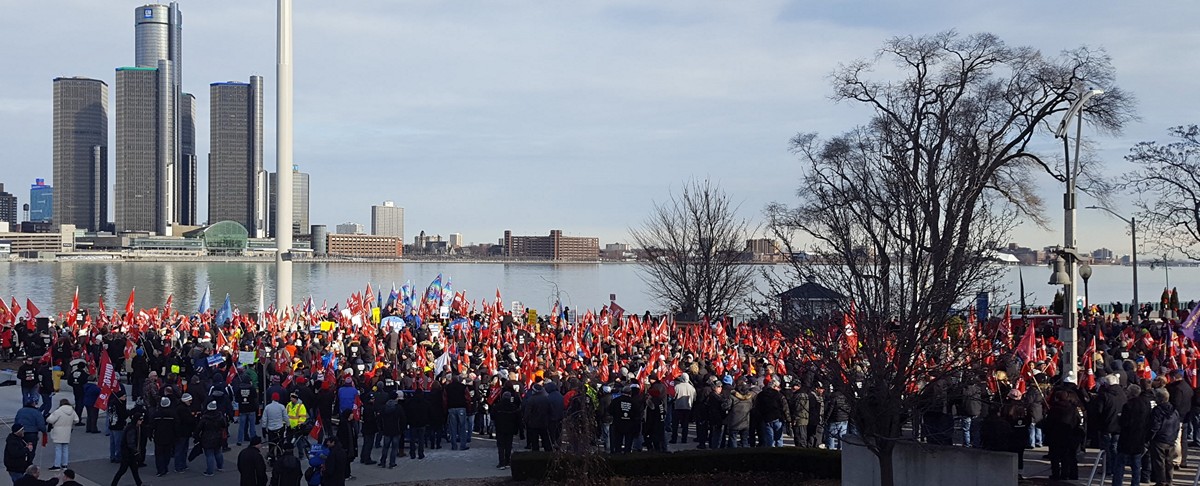
Windsor rally January 11, 2019, against closing of GM plant in
Oshawa,
held across the river from GM's Detroit headquarters.
•
Fraudulent Talk About Canada
and the
Rule of Law
Imposed
Arbitration at
the Post Office
• Postal Workers Continue the Fight
for Their
Rights - Louis Lang
Quebec Workers
Continue Fight for Rights
• Workers Mark First Anniversary of
ABI
Aluminum Smelter Lockout
• Crane Operators, Allies and
Experts All Say No! to Irresponsible New
Regulations
GM Threat to Close Oshawa Auto
Plant

Windsor rally against GM's closure of Oshawa plant, January 11,
2019.
GM's announced intention to close its Oshawa
Assembly
Plant effectively breaks the contract it signed with Unifor
in 2016. The contract committed GM not to close any Canadian
plant
before the agreement expires in September 2020. The
indignation
this has aroused and the calls to hold GM to account are
warranted.
Stirring
up anti-Mexico sentiments as a way to expose GM's greed, which
opens a
door to divide workers on a racist basis, is not warranted.
 GM was bailed out with
public funds to the tune of almost $11 billion dollars when
it
filed for bankruptcy protection in 2009. The public money
paid to
GM was diverted from necessary services and social programs such
as
health care and education. To pour salt in the wound inflicted on
Canadians, the federal and Ontario
governments made the bailout conditional on workers and retirees
making
significant concessions to those who own and control GM.
Meanwhile, the
Ontario government had already allowed GM and other large
companies
such as Stelco the right not to sustain workers' pension funds at
a
proper level. The government and big companies based this
anti-social action on the fraudulent claim of being too big to
fail.
Yet here was GM declaring bankruptcy and Stelco doing it more
than once
putting retirees' pensions at risk. GM was bailed out with
public funds to the tune of almost $11 billion dollars when
it
filed for bankruptcy protection in 2009. The public money
paid to
GM was diverted from necessary services and social programs such
as
health care and education. To pour salt in the wound inflicted on
Canadians, the federal and Ontario
governments made the bailout conditional on workers and retirees
making
significant concessions to those who own and control GM.
Meanwhile, the
Ontario government had already allowed GM and other large
companies
such as Stelco the right not to sustain workers' pension funds at
a
proper level. The government and big companies based this
anti-social action on the fraudulent claim of being too big to
fail.
Yet here was GM declaring bankruptcy and Stelco doing it more
than once
putting retirees' pensions at risk.
Even though GM declares healthy profits, it
refuses to
pay back $1.6 billion of the loan it received from the
Conservative Harper and Liberal McGuinty governments at the time
of the
pay-the-rich bailouts. A December article in the Detroit Free
Press
quotes Unifor President Jerry Dias citing an even higher amount,
saying
GM
still owes Canada $2.8 billion as repayment for the bailout.
No
official has explained why GM was not forced to pay back all the
public
funds despite making record profits for its private
investors.
CBC reported last October that an outstanding
loan for
more than $1 billion to GM Corp., originally made on
April 29, 2009, appears on Export Development Canada's
Account transactions. That amount does not include the interest
that
would have accrued over the almost ten years it has been on the
government's books.
Why has the government not called in this debt especially after
GM
announced its intention to break its agreement with Unifor and
its
commitment to Oshawa and Canadians not to close the Oshawa plant?
Is GM
using the threatened closure of its Oshawa plant as leverage to
have
the Trudeau government write off the remainder of the debt,
similar to the $2.6 billion Chrysler debt to Canada silently
written off last year?
 Whatever the case, GM
has
defrauded the workers and Canadians with the connivance of both
the
federal and provincial governments and this must not stand!
Governments
must now intervene in a manner that favours the workers, their
communities and Canadians. For example, if GM proceeds to close
the
plant as threatened, the government
could call in GM's outstanding loan and use the money to keep the
Oshawa plant producing until a longer term solution such as
finding new
owners could be found. To begin this process, the government
could put
a lien against GM's Oshawa facility for the amount of the
outstanding
loan. If GM refuses to change its course, it should pay a price.
That is only just. Whatever the case, GM
has
defrauded the workers and Canadians with the connivance of both
the
federal and provincial governments and this must not stand!
Governments
must now intervene in a manner that favours the workers, their
communities and Canadians. For example, if GM proceeds to close
the
plant as threatened, the government
could call in GM's outstanding loan and use the money to keep the
Oshawa plant producing until a longer term solution such as
finding new
owners could be found. To begin this process, the government
could put
a lien against GM's Oshawa facility for the amount of the
outstanding
loan. If GM refuses to change its course, it should pay a price.
That is only just.
Within the situation, the workers at the Oshawa
plant
and those at the many suppliers of material and parts should
formulate
their own demands that favour them and not wait and see what the
gods
of plague will impose as an alleged solution.

Workers shut down lines at Oshawa plant after GM confirms its
decision
to close the plant in a January 8, 2019 meeting with union
representatives in Detroit.

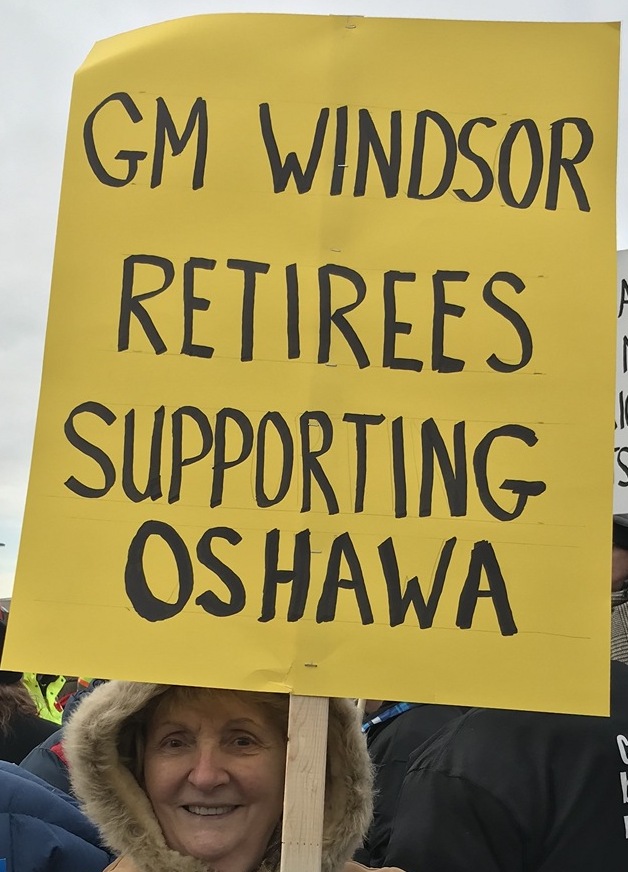  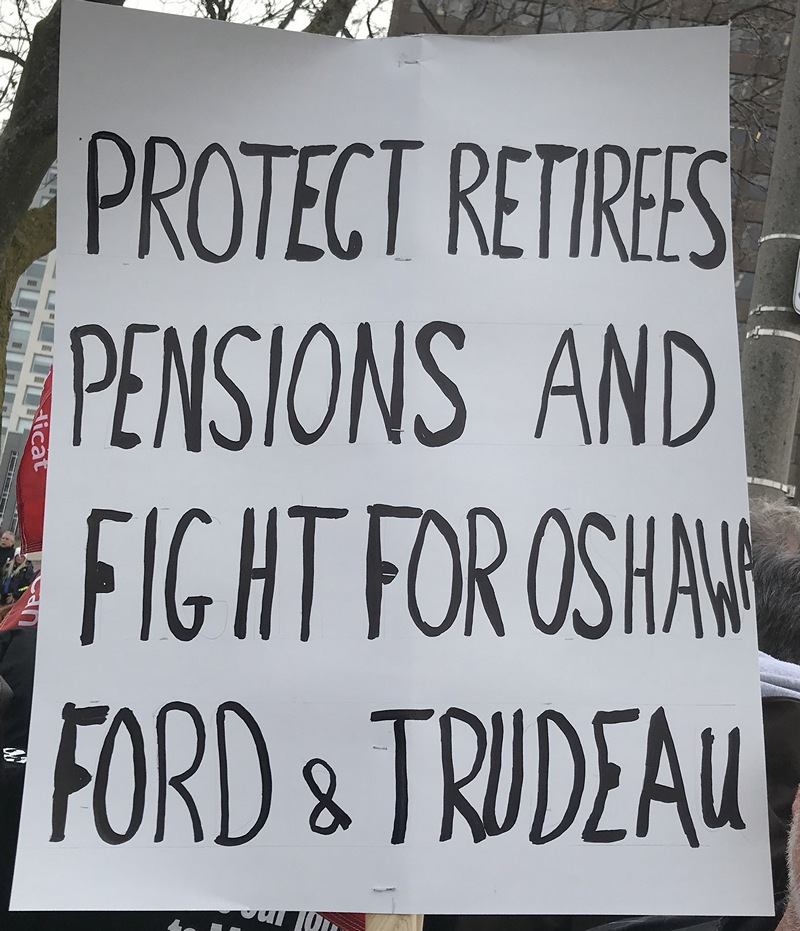
The Trudeau government makes much ado about Canada
being
a "rule of law country." The argument has been made a lot lately
in
defence of Canada's arbitrary arrest of a Chinese executive of
the
Huawei Company at the behest of the United States. The government
has
also used it to justify Canada's ongoing sales of military
vehicles to
Saudi Arabia based on a contract having been signed with that
country
and General Dynamics that could not be broken.
 However, the rule of
law
logic does not apply in the government's dealing with the auto
monopolies. Many see a double standard. GM stands accused of
breaking
several written and unwritten agreements, throwing workers' lives
and
their communities into turmoil, abandoning perfectly good means
of
production, and refusing to return billions
of dollars in public money given to it allegedly to avoid its
failure.
Yet, the governments of Canada and Ontario stand aloof, declaring
that
GM's
trashing of contracts is a private business decision. However, the rule of
law
logic does not apply in the government's dealing with the auto
monopolies. Many see a double standard. GM stands accused of
breaking
several written and unwritten agreements, throwing workers' lives
and
their communities into turmoil, abandoning perfectly good means
of
production, and refusing to return billions
of dollars in public money given to it allegedly to avoid its
failure.
Yet, the governments of Canada and Ontario stand aloof, declaring
that
GM's
trashing of contracts is a private business decision.
Are Canadians to accept that the rule of law is a
weapon to be used selectively to hammer those standing up for
their
rights such as Indigenous land defenders and workers on strike
such as
postal workers, or to legitimize the arrest of an executive of a
Chinese company on spurious grounds that the U.S. demands it?
This
self-serving use of the
rule of law to serve powerful interests throws the entire concept
of
the rule of law into contempt.
If governments refuse to intervene in public
affairs in
a manner that favours the people, and specifically in the case of
GM to
hold it accountable for its practices, Canadians should make sure
they
boycott those political parties that allow this to happen. The
people
should refuse to vote for either the Liberals or Conservatives
who both
have
taken part in selling out autoworkers and refuse to hold GM to
account
and defend the rights of Canadian workers and our collective
economy.
The NDP government of Bob Rae was infamous for introducing
pensions
holidays for companies like GM which it declared "too big to
fail." It
is high time workers select candidates for election who represent
them,
not the rich, and turn things around in their favour.

Imposed Arbitration at the Post
Office
- Louis Lang -

Windsor picket by postal workers and their allies, January 16,
2019, as
forced arbitration begins.
The government-imposed arbitration process at
Canada
Post began on January 16. The Liberal government's Postal Services Resumption and
Continuation Act denies
postal workers their right to strike to reach an agreement with
Canada
Post acceptable to themselves.
 A bulletin from the
Canadian Union of Postal Workers (CUPW) explains it planned to
use the
first day of arbitration to determine the issues still in dispute
and
the process to be followed by arbitrator Elizabeth
MacPherson. A bulletin from the
Canadian Union of Postal Workers (CUPW) explains it planned to
use the
first day of arbitration to determine the issues still in dispute
and
the process to be followed by arbitrator Elizabeth
MacPherson.
The legislation gives the Minister of Labour
discretion
to determine the remaining issues in contention but the Minister
chose
to transfer this authority to the arbitrator. The type of
arbitration
process to be followed also has to be decided. The legislation
provides
two types of arbitration processes: conventional interest
arbitration
and final offer
selection.
The union has declared that it will participate
in the
arbitration process on a "without prejudice basis subject to any
challenges or court rulings on the back to work legislation."
CUPW
filed a constitutional challenge with the Ontario Superior Court
on
December 11, 2018 claiming Postal
Services
Resumption
and
Continuation
Act violates the right of
the union to free
collective bargaining under the Charter
of
Rights
and
Freedoms. Paul
Cavaluzzo, a constitutional lawyer representing CUPW stated at
the
time, "The Liberal Government's legislation just like the
previous
Conservative law in 2011, unilaterally prohibits any lawful
strike."
On November 27, 2018, after five weeks
of
rotating strikes, the Postal
Services
Resumption and Continuation Act forced postal workers to
return
to work
under their previous collective agreement. Facing heavy fines
against
individual workers and the union, workers returned to work
without
their serious concerns having being addressed.
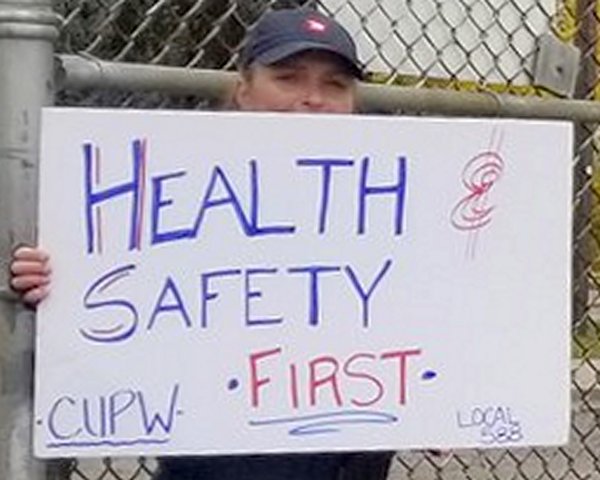 The mediation process
imposed by the Postal Services
Resumption and Continuation Act also failed to resolve any
of
the outstanding
issues and ended on December 17, 2018. The mediation process
imposed by the Postal Services
Resumption and Continuation Act also failed to resolve any
of
the outstanding
issues and ended on December 17, 2018.
The union estimates that from the day the federal
Liberal government forced postal workers to return to work
without a
new collective agreement to address the outstanding
issues, 750
disabling injuries have occurred, Rural and Suburban Mail
Carriers
(RSMCs) have worked approximately 439,000 hours without pay,
and
urban
workers have worked thousands of hours of forced overtime.
The union declares that postal workers will not
stop
fighting until the important issues confronting them are resolved
to
their satisfaction: health and safety, full-time secure
employment, and
equality for RSMCs must be addressed immediately.

Quebec Workers Continue Fight for
Rights
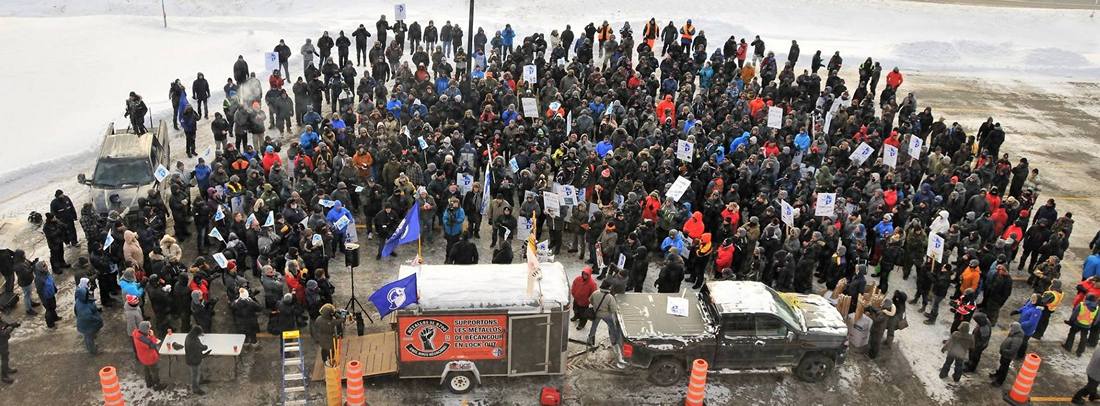
Mass picket as Bécancour aluminum smelter workers mark one
year
anniversary of lockout.
Bécancour aluminum smelter workers,
alongside
Quebec workers, marked the first anniversary of the ABI lockout
through
militant actions in defence of locked out workers and the dignity
of
labour. Hundreds of workers hailing from various regions,
including an
important contingent of workers from Sanguenay-Lac-Saint Jean,
formed
picket lines and then demonstrated outside the constituency
office of
the local member of the National Assembly for
Nicolet-Bécancour.

Demonstration outside the constituency office of the National
Assembly
member for
Nicolet-Bécancour.
They reiterated their two demands: that the
Premier meet
directly with company officials and demand that they return to
the
table to negotiate a collective agreement acceptable to the
workers;
that the government re-open its energy agreement with Alcoa by
virtue
of which the lockout is considered a "force majeure" that frees
the
Alcoa/Rio
Tinto cartel from paying for the block of hydro-electricity
reserved
for it and from paying fines when that energy is not used.
Workers are
demanding that the clause be annulled. They point out that the
agreement is one of the reasons why the company's owners not only
refuse to negotiate with them, but are getting Quebeckers to pay
for
the
lockout, while Hydro-Québec and Quebec are deprived of
important
revenue.
 "There was little
separation between the parties last January when the dispute
broke out.
The gap has widened since then and more than 1,000 families
have
suffered for an entire year due to the greed of a multinational,"
noted
Clément Masse, President of United Steelworkers
Local 9700
that represents the ABI workers, at the
rally outside the constituency office. "We need the government to
get
out of its pseudo-neutrality and restore some balance to this
process.
ABI is abusing the process and keeping hundreds of families in a
state
of insecurity, with the complicit silence of the Quebec
government." "There was little
separation between the parties last January when the dispute
broke out.
The gap has widened since then and more than 1,000 families
have
suffered for an entire year due to the greed of a multinational,"
noted
Clément Masse, President of United Steelworkers
Local 9700
that represents the ABI workers, at the
rally outside the constituency office. "We need the government to
get
out of its pseudo-neutrality and restore some balance to this
process.
ABI is abusing the process and keeping hundreds of families in a
state
of insecurity, with the complicit silence of the Quebec
government."
Workers note that so-called government assistance
in
the negotiation process, such as with mediation, the mediation
council
and now the working group which the Minister of Labour is
proposing to
set up, is a figment of the government's imagination, as the
cartel of
company owners has the utmost contempt for such arrangements. On
December 19, 2018, two days before the negotiation
deadline
set by the Minister of Labour, the company owners announced the
shutdown of half of the pot lines still in operation at the
smelter,
demonstrating that they do not recognize that negotiation
process.
Restarting those pot lines is a long and costly process and
anyone
wanting
to negotiate would not behave in such a manner.
The Minister's latest invention is the
establishment of
a working group which would use the ministry's resources as
"support"
for the parties to reach a negotiated settlement. The Minister
did not
explain how one supports a party which refuses to budge and only
recognizes its own dictate.
Meanwhile, workers are exposing the difficulties
they
are experiencing, despite United Steelworkers union allocations
and the
extraordinary support, including financial, they are receiving
from
workers in Quebec, Canada and elsewhere. They are also reporting
on the
difficulties being created for the local economy, such as jobs
being
cut by
suppliers, loss of revenue by merchants, and the Mayor of
Bécancour noting that approximately 14 per cent of
the
municipality's budget comes from tax revenue provided by the
plant.
Workers face difficulties in maintaining their stand that they
want to
go back to work with their heads held high, through a
successfully
negotiated agreement
acceptable to them. That stand is in everyone's interest, as
without
opposition to dictate and insistence on having a decisive say
over
decision-making, insecurity for workers and for all would be
complete.
In that respect, ABI workers are intensifying
their
work to mobilize the organized support of workers in Quebec and
Canada,
as well as elsewhere. At the end of 2018, more than 300
union
locals in Quebec, Canada, the U.S. and Australia were sending
financial
assistance to ABI workers in support of their struggle and that
mobilization is being stepped up.
Workers are turning their attention towards ABI,
as
this struggle is everyone's struggle, for their rights as well as
their
dignity.

   
 

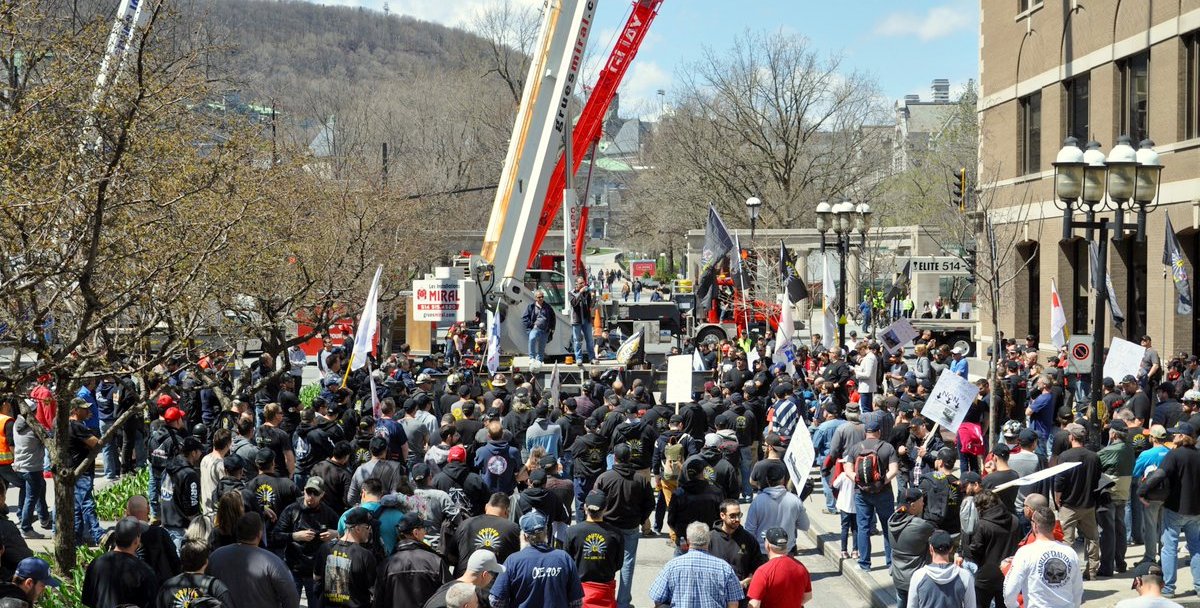
Crane operators demonstrate against changes to regulations on
training,
May 5, 2018.
Between December 17-19, 2018, three days
of
hearings were held by the committee set up by the Quebec
government to
look into the impact on
health and safety of regulatory changes to the training of crane
operators in Quebec.
The hearings, set up by the previous Couillard
Liberal
government, came as a result of the courageous actions by crane
operators to oppose a new anti-worker regulation imposed by the
Quebec
Construction Commission (CCQ) and the Quebec government, which
poses a
threat to safety.
 Following their many
actions and denunciations, crane workers refused to show up for
work
during an entire week last June, demanding nothing less than the
complete withdrawal of the new regulation. They did so because
they saw
it as a serious erosion, both in terms of quantity as well as
quality,
of the training formerly required by workers
to become crane operators. The government, at the request of the
CCQ,
had abolished the obligatory 870 hours of training required
for
obtaining a Diploma of Vocational Studies (DVS). The DVS is now
optional, and new direct training of 150 hours has been
introduced, now provided on site and under the responsibility of
companies.
The CCQ and the government have also created an 80-hour
course for
the operation of boom trucks with a maximum capacity of 30
tonnes,
following which the worker who successfully completes the
training
becomes a qualified driver of such trucks. It is precisely that
type of
crane that overturns the most frequently and causes the
most damage. Crane operators are facing repressive measures such
as a
decision by the Administrative Labour Tribunal declaring they
participated in an illegal strike, while the CCQ continues to
threaten
to take action against them for the illegal strike as well as for
intimidation. The courageous position of the crane operators has
garnered the
support of the vast majority of workers as well as the population
and
it
is within that context that the committee was set up. Following their many
actions and denunciations, crane workers refused to show up for
work
during an entire week last June, demanding nothing less than the
complete withdrawal of the new regulation. They did so because
they saw
it as a serious erosion, both in terms of quantity as well as
quality,
of the training formerly required by workers
to become crane operators. The government, at the request of the
CCQ,
had abolished the obligatory 870 hours of training required
for
obtaining a Diploma of Vocational Studies (DVS). The DVS is now
optional, and new direct training of 150 hours has been
introduced, now provided on site and under the responsibility of
companies.
The CCQ and the government have also created an 80-hour
course for
the operation of boom trucks with a maximum capacity of 30
tonnes,
following which the worker who successfully completes the
training
becomes a qualified driver of such trucks. It is precisely that
type of
crane that overturns the most frequently and causes the
most damage. Crane operators are facing repressive measures such
as a
decision by the Administrative Labour Tribunal declaring they
participated in an illegal strike, while the CCQ continues to
threaten
to take action against them for the illegal strike as well as for
intimidation. The courageous position of the crane operators has
garnered the
support of the vast majority of workers as well as the population
and
it
is within that context that the committee was set up.
At the December hearings, those who intervened
included
the crane operators' union, which represents the vast majority of
Quebec's crane operators; the crane operators' collective;
construction
unions; the school that provides the vocational training for
crane
operators; the union representing those who teach the training
courses;
crane
businesses;
construction companies; as well as crane operation health and
safety
experts. Intervenors were given 25 minutes to present their
views,
with their submissions being followed by a 30-minute
exchange with
committee members.
The great majority of intervenors were of the
opinion
that the new regulation has to be completely overhauled and that
compulsory crane operator vocational training must be maintained.
They
opposed the new regulation as a violation of safety standards and
in
particular raised the need for the adequate training of crane
operators, which
is central to
the safety of not only crane operators, but other workers and the
public at large. They specifically referred back to the Canadian
Standards Association's Z 150 standard that all Quebec crane
workers are subject to. The standard specifies the safety
requirements
relating to mobile cranes to ensure the safety of workers and the
public and serves
as a guide to manufacturers and those who purchase cranes, as
well as
construction companies and governments and regulatory bodies, so
that
the safety standards established through the Z 150 code are
respected.
Notably, the code specifies that mobile cranes
must be
operated exclusively by qualified persons and that the mandatory
qualifications of crane operators must include the relevant
training
and experience for their proper operation, as well as overall
knowledge
of crane construction, along with sufficient knowledge of
electricity
and hydraulics.
Those who intervened noted that the new regulation clearly does
not
uphold any of this.
Only two associations representing construction
companies supported the new regulation. One of them was
disingenuous
indeed. It argued that it was better to have the new regulation
and
training in place than to have no regulation or training at all.
It
added that many construction
companies purchase boom trucks and have them operated by
unqualified
and untrained
workers, which is clearly illegal. It should be noted that the
CCQ has
taken no legal or other action to put an end to this illegal
situation.
The representatives of that association now claim that this will
all be
legal as there will be training, never mind that the workers do
not
consider it adequate or vocational, despite the fact that boom
trucks
are
precisely those that overturn so easily and are used in zones
where the
public circulates most often.
Crane operators are determined to have their two
demands met: that the new regulation be withdrawn and obligatory
crane
operator training be maintained and that a roundtable be created
which
includes all concerned parties, including teachers, to look into
the
problems linked to the crane operator sector and construction
site
safety.
The committee will now be holding in
camera
meetings with various parties and must submit its report to the
Minister of Labour by February 28.

PREVIOUS
ISSUES | HOME
Website:
www.cpcml.ca
Email:
office@cpcml.ca
|

